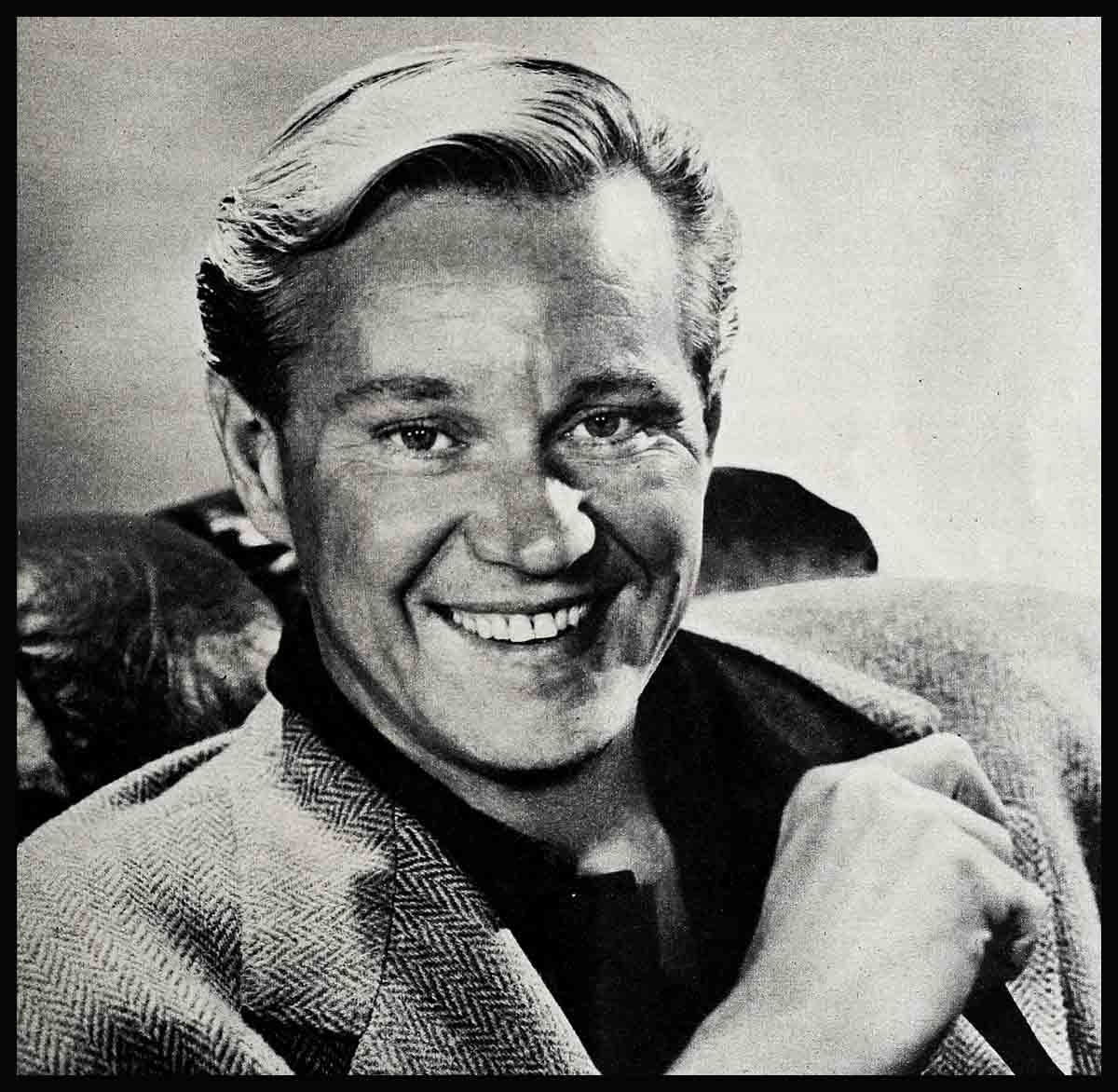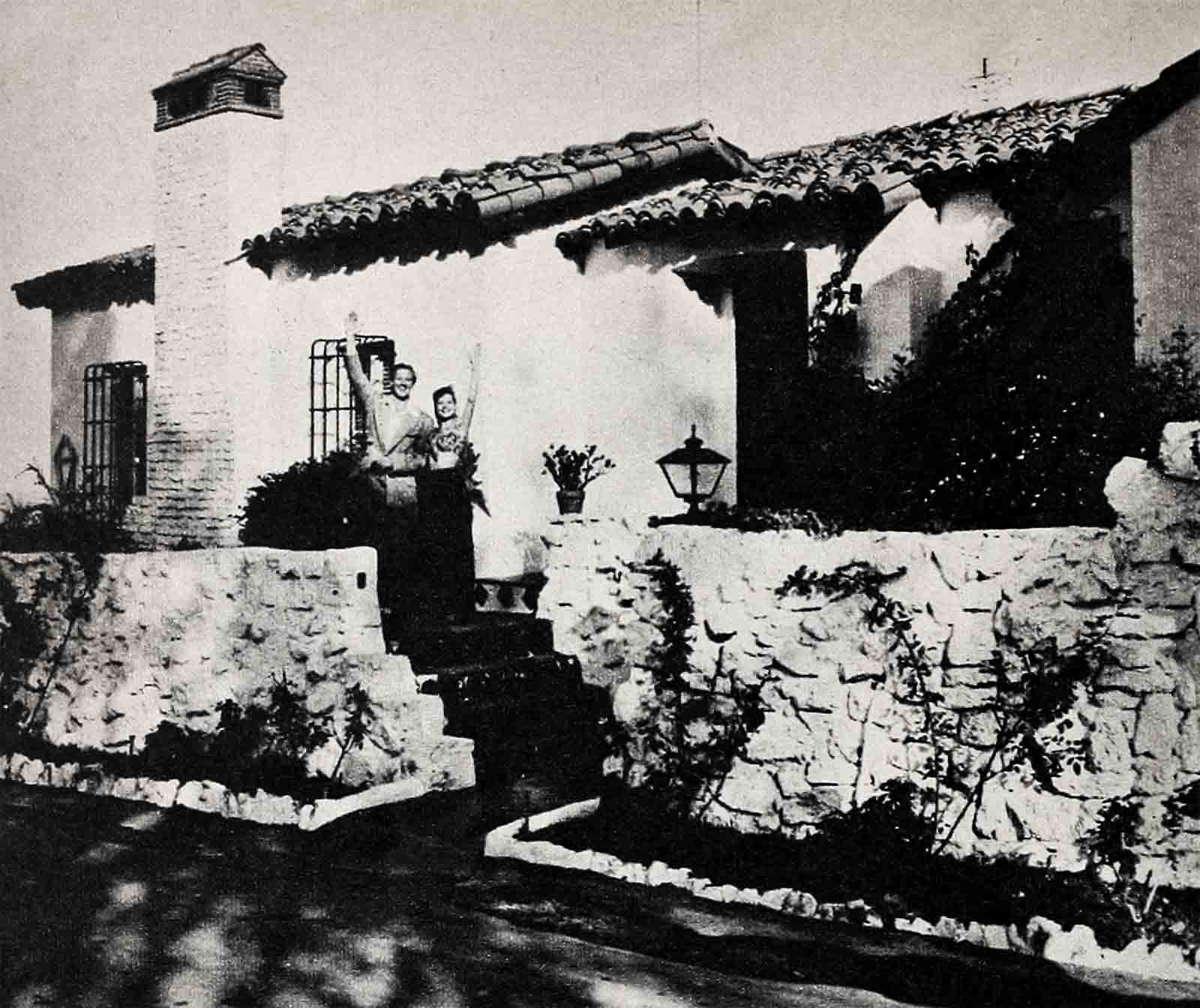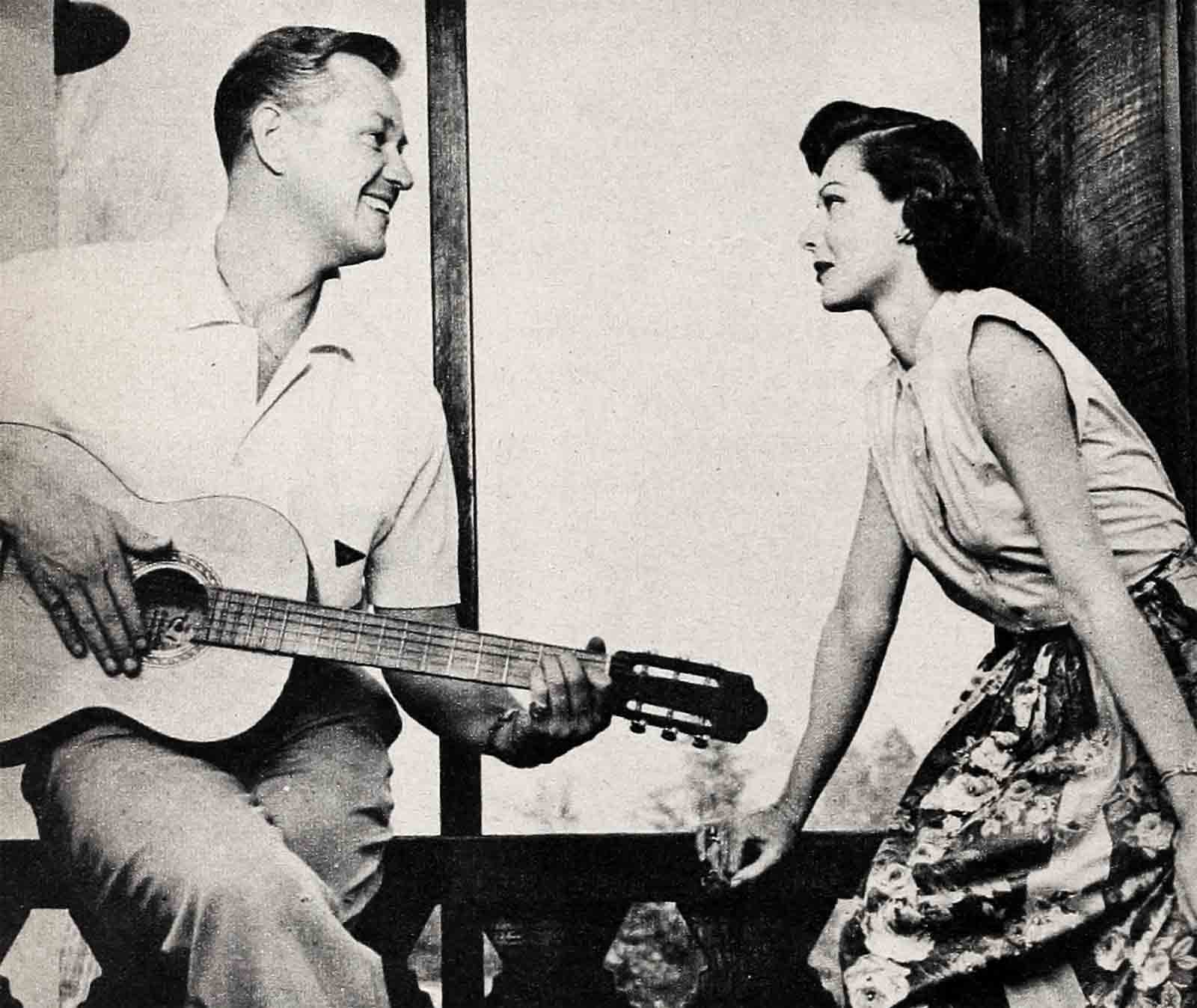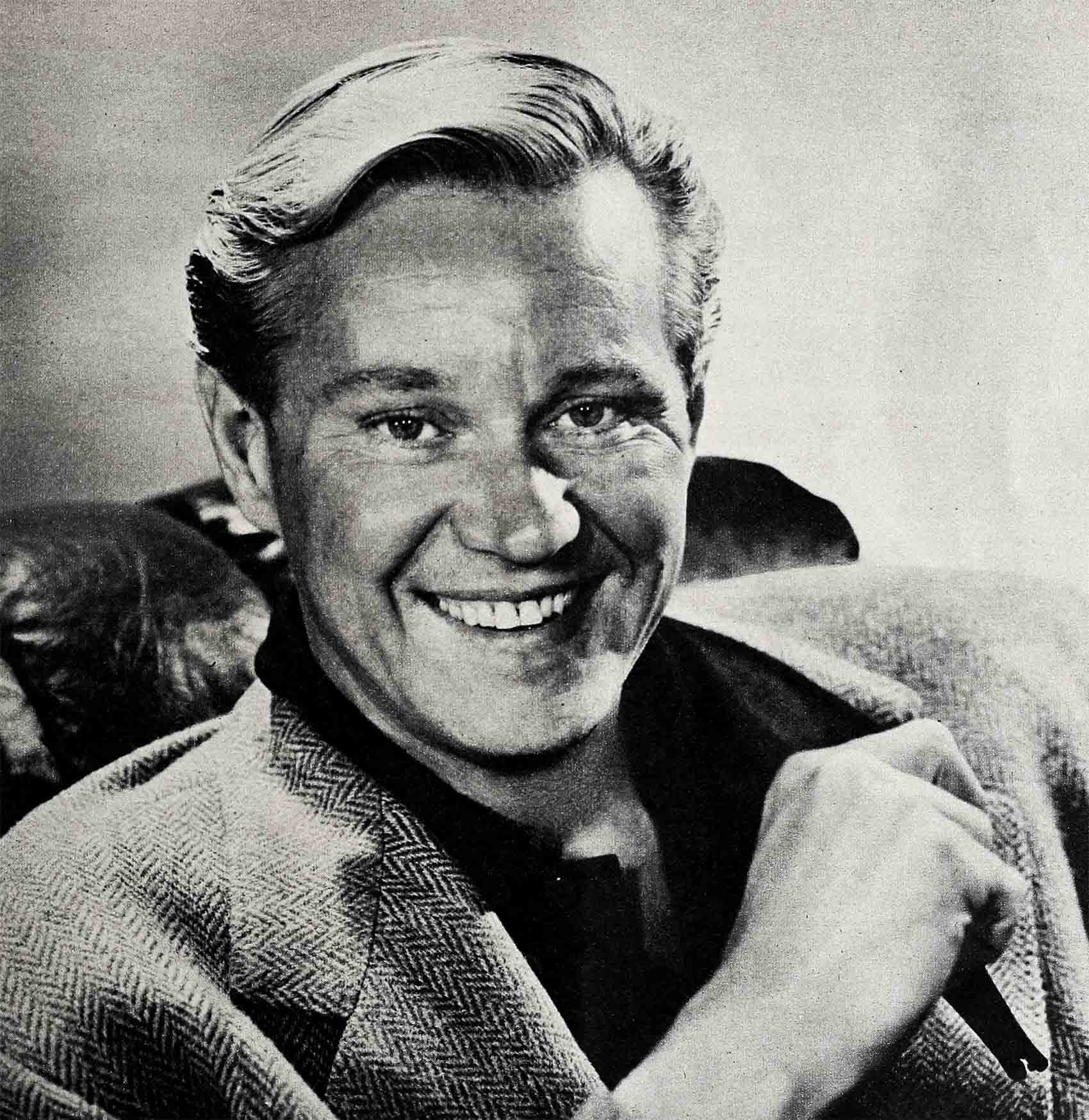
Look Ma, He’s Famous!—David Brian
A few weeks ago, David Brian was invited to a party at Lou Wasserman’s. Mr. Wasserman is head of the mighty Music Corporation of America which holds David’s contract. An invitation to a party like this means, but definitely, that you are a hit, headed up. David didn’t need that assurance, particularly. He can read. He can hear what people are saying. And there is the critical response to his very few performances, starting with “Flamingo Road,” going on to “Intruder in the Dust,” “Beyond the Forest” and currently, “The Damned Don’t Cry.”
Nevertheless, David accepted the Wasserman invitation with the greatest pleasure. And on this occasion he wore his own dress clothes. That was an event, too. For less than a year ago, when he was ordered to attend the premiere of his debut picture, “Flamingo Road,” he went in Errol Flynn’s shoes and Mike Muzurki’s dress suit. In other words, he possessed neither.
He walked into the Wassermans’ as a rumba was being played in the cellophane tent that covered the garden. All about him was wealth and celebrity. He took Joan Crawford into his arms for his first circuit around the floor. The next number was a waltz and for that Bette Davis was his partner. “I kept wishing my mother were there,” David said. “I wanted to say, ‘Look, Ma, with whom I’m dancing.’ ”
Consider this merely as one illustration of the way Mr. B. is taking his skyrocketing Hollywood success, not seriously, but with high delight.
One more payment and he will own his car. Three more payments and he will be out from under the second mortgage on his house in the Valley. There will remain the considerable sum of the first mortgage to go. But that doesn’t worry David.
Yet, for the first time in his haphazard, colorful life, he’s worrying. About calories. “Before ‘Flamingo Road,’ ” he confesses, “I lived largely on a diet of parsley between two slices of newspaper. When I made the test, I weighed 180. At six-feet-three-and-a-half, that’s thin. So what happens is that Warner Brothers dote on my looks at that weight and I fall for a girl who cooks like a master chef.”

Adrian is, of course, Adrian Booth, the Republic actress, who has been Mrs. David Brian since June 20, 1949, which is only a few days after David got his divorce from Bonita Feidlar. David wishes that Adrian were the only Mrs. Brian there had ever been, he’s that in love with her. Actually, she is his third wife. He is, you see, the romantic kind of guy who must have women around, and when he loves, he marries.
He and Adrian, in love in a wonderfully wacky way, are a clear example of like appealing to unlike. Adrian didn’t dance much when they first met. David is so good he has danced professionally at no less swank a spot than the Shoreham Hotel in Washington where good Senators go to relax. The team had the improbable name of Brian and Winsome, Winsome’s other name being Courtney. “She weighed ninety-eight pounds and did all the dancing,” David says, “while I did all the mugging.” They weren’t much of a hit. But they fell in love and married. That wasn’t much of a hit, either. They divorced.
Adrian is very much of a family girl, with a deeply developed domestic sense, while, until they met, David’s idea of a home was “anything with four walls that kept the rain out.” When they married, Adrian announced she wanted a modern house. David wanted a traditional one. So they compromised. “We got a real antique,” David explains. “Antique for the San Fernando Valley, that is. It was built way back in 1934.”
In exchange for his lessons in the rumba, Adrian has given David lessons in the art of fine eating, and he finds it very pleasant when she does one of her specialties, such as stuffing a leg of lamb with wild rice and apricots. It’s so unlike that time when he was on the road and he and a fellow actor kept body and soul together for months by means of an electric percolator. First they’d make coffee in the percolator. Then, washing it out, they’d use it to heat soup. It always meant that one or the other course was cold by the time they consumed it, but it kept starvation at bay.

Having been in show business ever since he left New York’s City College, David has suddenly fallen in love with the California soil. He gets up and into it with the sun. Come seven a.m., while Adrian slumbers, he’s out gardening. By eight-thirty, he starts wondering which of their friends he can telephone. At nine, he’s both surprised and annoyed when he discovers he has waked most of them up.
He did a little bit of everything to survive between acting jobs, acting being the only thing he has ever wanted to do. This is not his first excursion to Hollywood, but ’ the last time he was out the nearest he got to the industry was being a carpenter on Gladys Cooper’s house.
Before this, while he was still going to college, and when the aunt, who was paying his tuition, wanted him to become a CPA, he was a doorman at the famous Roxy Theatre in New York. Then, as a result of his overhearing a conversation in front of the Roxy, about their being a “call” at the nearby Imperial Theatre, he became a chorus man.
He wasn’t sure what a call was, but he hoped it might be stage work. He went through the stage door and the casting director saw that bright hair of his, those blue eyes and his really magnificent shoulders on his big frame. “You have to be able to sing for this job,” the stage manager announced. “What’s your range?”
David thought a range was either something you were home on, or that you cooked on. He said, very casually, and most truthfully, “I don’t know.”
“Well, go over to the piano and let’s hear you,” the stage manager ordered.
Five minutes and one tune later, David The play was “The New Moon” and it ran such a goodly stretch that Mr. Brian actually accumulated $75 in cash money.
He had never had that much dough, all in one piece before. He planned to put it into the bank as a real nest egg against the future, but right then a cocker spaniel named “My Own Brucie” won best of show at the Westminster, New York’s smartest canine event. David heard, somehow, that “My Own Brucie” had a pup for sale. The price was just seventy-five clams.
Now, he can’t possibly remember why he had to have that pup, but he did, so he got him. His landlord later got David. You know how it is with pups in New York where they are not too close to grass or trees. David reluctantly gave the pooch to some children in the suburbs.
The next few years clearly demonstrated that he had been born with grease paint in his veins because, while he was more often “between engagements” than in any show, carnival, dance act, comedy turn or whatnot, he still loved the theater. He existed in that dizzy world where many another great star has lived before him, or as he says, “You wake up in the morning, look at your dough and decide between two cups of coffee or a pack of butts. You decide on the cigarettes, because a friend is more apt to ask you in for a cup of coffee, and you just can’t plain ask somebody to give you a pack of smokes.”

He had the actor’s pride that never lets you admit hunger when you don’t have the price of a meal, nor confess that you’re not wearing socks because you haven’t any. David’s favorite joke tells of the time he got a single evening’s engagement at a club and needed to wear a boiled shirt. He didn’t have the price of having one laundered, so he did it himself. What he didn’t know was that when you starch such a shirt, you just do the front of it. He starched it all and had difficulty in either sitting or standing still.
When the war came David went into the Coast Guard, saw much action in the North Atlantic and returned to civilian life in his chronic state; penniless. He possessed only one thing of any value, a cinnamon diamond ring, given to him by the famous vaudevillian, Ted Healey, with whom he did a comedy act.
He was often tempted to pawn this ring or even to sell it, but now he’s glad he never did. He gave it to Adrian for her engagement ring. To show you the kind of girl Adrian is, she had the diamond reset for herself and gave David a black sapphire in the old setting. This was the best compromise she could think of so David could give her his ring but still have it. Her husband was delighted.
His initial meeting with Adrian was as unexpected as his initial meeting with Joan Crawford. The Crawford meeting has been told before but I repeat it here for its one new touch.
Waiting around in Hollywood, David was invited to a party given for a girl who was breaking in a night club act. There he met Lucille Safford, a nurse employed to care for Joan Crawford’s children.
One evening, several days later, Lucille heard Joan discussing her great difficulty in finding the right leading man for “Flamingo Road,” an actor with strength of character and authority. Lucille suggested David as a possibility, and Joan suggested to director Mike Curtiz that he grant David an interview. In the meantime, every available leading man in Hollywood was being tested.
Mike is a terrorizing character. He can out-yell everybody in Hollywood. Therefore, when the unknown David Brian was presented to him, he gave him the works, along with the test. But Mr. Brian didn’t scare worth a cent.
David will tell you now, with a complete lack of conceit but with a very just realization, “It was a damned good test. Joan had gotten me the script the day before, and I had studied the scene I was to do for.a solid twenty hours. Mike’s yelling, instead of paralyzing me, helped me. It even affected me that way during the shooting of the actual picture. Because the man’s an artist, a great artist, and actually, when he’s yelling, he’s keyed up, trying to get the best out of both you and himself.”
His meeting with Adrian had an ironic twist to it. An actor friend of his, Dale Robertson, was up for “Flamingo Road,” too, even before David was up for it. David said he wished he knew some nice girl to date. Dale mentioned Adrian and arranged their first meeting. The rest is vital statistics, with the added touch that all Robertson got was a very small part in the Crawford production.
Only one thing about his entire Hollywood success irks David, and that only irks him mildly, because of his always-operating sense of humor. But he does feel, having put in the long theatrical apprenticeship he has, that people shouldn’t compliment him on being “so perfectly natural” on screen. “Whenever anybody is perfectly natural on stage or screen, they are doing their best acting,” he says.
David especially admires Joan Crawford and Bette Davis because they are such good troupers. In “The Damned Don’t Cry” there was a scene, shot from his angle, for which Joan had to have her head buried in his shoulder, supposedly crying. David was both impressed and grateful that Joan actually cried during ‘every take, even though her face never did show, and the scene was always his.
Undoubtedly, David has what it takes to be a very great star, and that’s much more than acting ability, no matter how masterly the talent. He has that Gable quality that makes a girl very aware of being feminine whenever she sees him.
He shares another characteristic with Gable: The chances of his losing his head are practically non-existent. When Warners ordered him to Montana for the opening of the picture of that name, although said picture stars Errol Flynn who wasn’t forced to go, David didn’t mind one bit. He liked the trip and he was allowed to take Adrian along.
“So I walk out, all properly introduced to the audiences,” he says, “and not a soul has ever heard of me. But Adrian steps out, this Montana territory is where they play those Westerns she’s made for Republic, and the crowd ate her up.”
He tells another yarn on himself concerning the night of the preview of “The Damned Don’t Cry.” He plays a terrific heavy in this and he believed he really was pretty good. “I turn to my adoring wife,” he says, “waiting for her loving compliments and what does she say? Shuddering, she remarks, ‘Am I married to a fiend?’ ”
“That,” I said, “was a big tribute to your acting.”
David grinned. “Not at all. I was, as the critics say, being perfectly natural.”
THE END
—BY RUTH WATERBURY
It is a quote. PHOTOPLAY MAGAZINE JULY 1950





No Comments